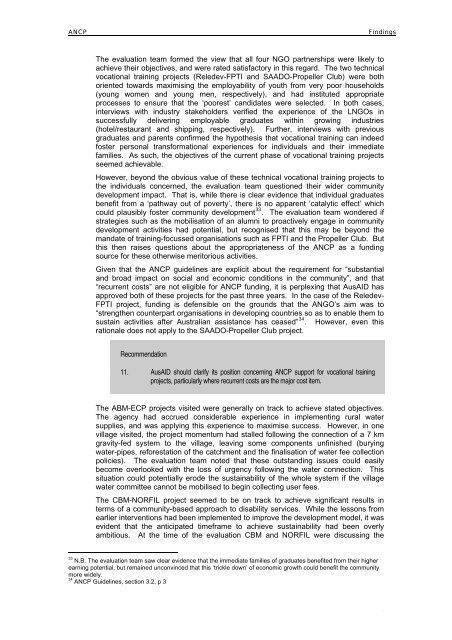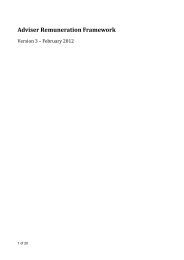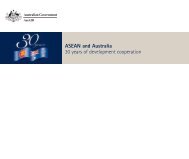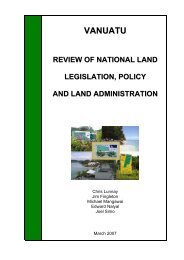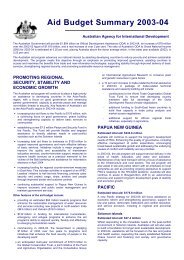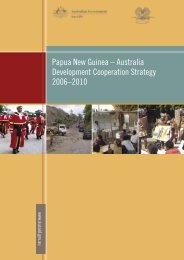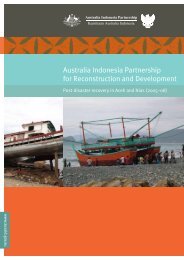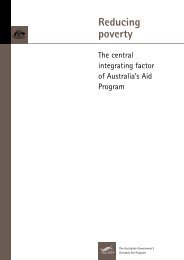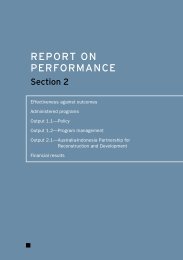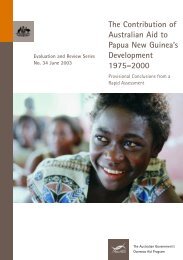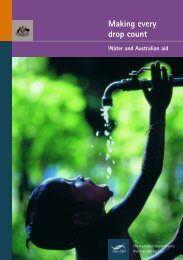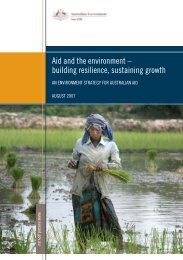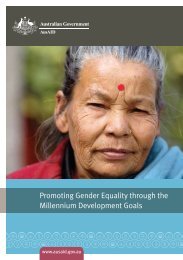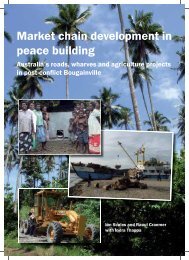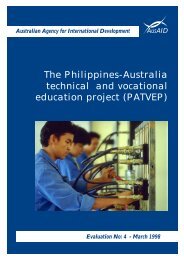ANCP Philippines Cluster Evaluation Report - AusAID
ANCP Philippines Cluster Evaluation Report - AusAID
ANCP Philippines Cluster Evaluation Report - AusAID
You also want an ePaper? Increase the reach of your titles
YUMPU automatically turns print PDFs into web optimized ePapers that Google loves.
<strong>ANCP</strong>FindingsThe evaluation team formed the view that all four NGO partnerships were likely toachieve their objectives, and were rated satisfactory in this regard. The two technicalvocational training projects (Reledev-FPTI and SAADO-Propeller Club) were bothoriented towards maximising the employability of youth from very poor households(young women and young men, respectively), and had instituted appropriateprocesses to ensure that the ‘poorest’ candidates were selected. In both cases,interviews with industry stakeholders verified the experience of the LNGOs insuccessfully delivering employable graduates within growing industries(hotel/restaurant and shipping, respectively). Further, interviews with previousgraduates and parents confirmed the hypothesis that vocational training can indeedfoster personal transformational experiences for individuals and their immediatefamilies. As such, the objectives of the current phase of vocational training projectsseemed achievable.However, beyond the obvious value of these technical vocational training projects tothe individuals concerned, the evaluation team questioned their wider communitydevelopment impact. That is, while there is clear evidence that individual graduatesbenefit from a ‘pathway out of poverty’, there is no apparent ‘catalytic effect’ whichcould plausibly foster community development 33 . The evaluation team wondered ifstrategies such as the mobilisation of an alumni to proactively engage in communitydevelopment activities had potential, but recognised that this may be beyond themandate of training-focussed organisations such as FPTI and the Propeller Club. Butthis then raises questions about the appropriateness of the <strong>ANCP</strong> as a fundingsource for these otherwise meritorious activities.Given that the <strong>ANCP</strong> guidelines are explicit about the requirement for “substantialand broad impact on social and economic conditions in the community”, and that“recurrent costs” are not eligible for <strong>ANCP</strong> funding, it is perplexing that <strong>AusAID</strong> hasapproved both of these projects for the past three years. In the case of the Reledev-FPTI project, funding is defensible on the grounds that the ANGO’s aim was to“strengthen counterpart organisations in developing countries so as to enable them tosustain activities after Australian assistance has ceased” 34 . However, even thisrationale does not apply to the SAADO-Propeller Club project.Recommendation11. <strong>AusAID</strong> should clarify its position concerning <strong>ANCP</strong> support for vocational trainingprojects, particularly where recurrent costs are the major cost item.The ABM-ECP projects visited were generally on track to achieve stated objectives.The agency had accrued considerable experience in implementing rural watersupplies, and was applying this experience to maximise success. However, in onevillage visited, the project momentum had stalled following the connection of a 7 kmgravity-fed system to the village, leaving some components unfinished (buryingwater-pipes, reforestation of the catchment and the finalisation of water fee collectionpolicies). The evaluation team noted that these outstanding issues could easilybecome overlooked with the loss of urgency following the water connection. Thissituation could potentially erode the sustainability of the whole system if the villagewater committee cannot be mobilised to begin collecting user fees.The CBM-NORFIL project seemed to be on track to achieve significant results interms of a community-based approach to disability services. While the lessons fromearlier interventions had been implemented to improve the development model, it wasevident that the anticipated timeframe to achieve sustainability had been overlyambitious. At the time of the evaluation CBM and NORFIL were discussing the33N.B. The evaluation team saw clear evidence that the immediate families of graduates benefited from their higherearning potential, but remained unconvinced that this ‘trickle down’ of economic growth could benefit the communitymore widely.34<strong>ANCP</strong> Guidelines, section 3.2, p 3<strong>ANCP</strong> <strong>Philippines</strong> <strong>Cluster</strong> <strong>Evaluation</strong> <strong>Report</strong> (ver. 2.0) 13


